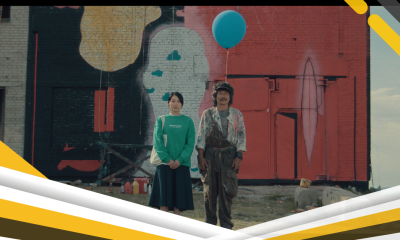More Women Filmmakers and Greater Diversity at Ventana Sur’s Primer Corte, Copia Final Programs

Ventana Sur, a prominent Latin American film market, is increasingly becoming a significant platform for showcasing diverse cinematic voices. The latest editions of its industry centerpieces, Primer Corte and Copia Final, highlight a notable increase in the representation of women filmmakers and a broader spectrum of narratives from across the region. This shift, partly influenced by a reduction in federal support for Argentine titles, has opened pathways for new perspectives, including films from the Caribbean, Ecuador, Uruguay, and Peru, enriching the overall landscape of Latin American cinema.
A Shifting Landscape: Embracing New Voices and Perspectives
The curating team for Ventana Sur’s Primer Corte and Copia Final programs, consisting of Pamela Biénzoba, Juan Crespo, and Eva Morsch Kihn, has observed a distinct evolution in the submitted projects. A key trend is the emergence of new voices, expanding beyond traditional filmmaking hubs. Films from regions like the Caribbean, Ecuador, Uruguay, and Peru are participating, with a Puerto Rican film, “Braided,” being particularly anticipated. This geographical broadening brings fresh cultural insights and storytelling approaches to the forefront.
Beyond geographical diversity, the programs are also seeing a significant rise in the number of women filmmakers. This increased representation is contributing to a wider array of themes, notably more family-centered stories. Furthermore, the curatorial team identified a notable presence of coming-of-age narratives from both emerging and established directors. There has also been an uptick in comedy projects, with several demonstrating strong execution—a genre often challenging to master effectively. Hybrid projects and films employing unconventional narratives are also gaining traction, alongside more traditional social dramas, reflecting a dynamic creative environment.
Curatorial Insights and Selection Philosophy
The selection process for Primer Corte and Copia Final is a collaborative effort, guided by the distinct perspectives of its curatorial team. Pamela Biénzoba, a Chilean-French consultant, programmer, and film critic, emphasized the excitement around new voices, citing films like Puerto Rico’s “Braided” as a highlight. Eva Morsch Kihn, who also serves as programming coordinator for Cinelatino Festival in Toulouse, echoed the observation about the rise of women filmmakers and the prevalence of family themes. She also underscored the consistently high quality of acting evident in the submissions, particularly from young talents, praising the strong performances. Morsch Kihn specifically mentioned anticipated films such as “My Uncle’s Movie” by Natalia Cabral, “Missing” by Kenya Márquez, and Juan Andrés Arango’s “Where the River Begins” as examples of the program’s caliber.
Juan Crespo, founder of 3C Films, brought a strategic perspective to the curation. His evaluation prioritized titles with genre appeal, narratives capable of global resonance, and projects adaptable to broader exploitation markets. This focus aims to facilitate sales and distribution across multiple territories, positioning films within festival and buyer circuits that value commercially viable profiles. Crespo emphasized that while artistic merits remain a priority, the overall curation sought to engage a wider audience without compromising the quality of the selected works, thereby enabling faster distribution agreements and market access.
Spotlight on Primer Corte Projects
Primer Corte showcases works-in-progress, offering a crucial platform for films nearing completion to secure post-production partners, funding, and international exposure. This year’s selection underscores the program’s commitment to diverse storytelling and emerging talent:
- “Awaiting Birds” (“Madre pajaro,” Sofía Quiros, Argentina, Spain): This coming-of-age story follows eight-year-old Oliver, who stays with his aunt Paloma while his mother receives treatment. The film, from the producing team behind the 2019 Cannes Critics Week title “Land of Ashes,” delves into themes of loss and the reluctant embrace of maternal instincts.
- “Back to Back Copacabana” (“Bate e volta Copacabana,” Juliana Antunes, Camila Matos, Brazil): A coming-of-age road drama exploring a transformative night for Paulinha, Gabi, and Michele on Brazil’s highways. Produced by Ventura, with co-producers Globo Filmes and Canal Brasil, the film aligns with Ventura’s mission to champion female and queer voices in Brazilian cinema.
- “The Devil’s Well” (“Los pozos del diablo,” Jairo Boisier Olave, Chile): This drama follows 15-year-old Judith, who possesses the ability to locate underground water. She uncovers a water theft network linked to a powerful avocado farm, potentially involving her own father, addressing urgent themes of water scarcity and corruption.
- “The Good Charm Society” (“Waturapankiman,” Marina Herrera, Peru, Bolivia): A comedy where Alexandra inherits her late father’s fortune-telling shop and embarks on a tarot-guided quest. Director Marina Herrera describes it as “an experiment in unlearning cinema,” prioritizing natural acting, improvisation, and real spaces to blend fiction and documentary elements.
- “Petardos y Magnolias” (Sandra Reynoso, Mexico): Produced by Francisco González Compeán, executive producer of “Amores Perros,” this drama centers on Vera, a young soccer star torn between her dreams and her father’s wishes, as she discovers love with a school hooligan. It offers a fresh perspective on first love within Mexican public schools.
- “Where the River Begins” (“Donde comienza el rio,” Juan Andrés Arango, Colombia, Canada, Norway): A drama that follows Yajaira, a young Emberá mother, and Jhon, a gang member, as they flee Bogotá towards the Andágueda River in search of belonging. The film reflects on a nation’s journey to redefine its sense of belonging after decades of conflict.
Spotlight on Copia Final Projects
Copia Final presents films that are in their final stages of post-production, seeking distribution and sales opportunities. This year’s selection highlights compelling narratives and directorial visions:
- “Braided” (“Trenzadas,” Raisa Bonnet, Puerto Rico): Set in post-Hurricane María Puerto Rico, this drama depicts a mother and her daughters searching for home amidst devastation, exploring the profound human impact of climate disaster. Director Raisa Bonnet notes the film serves as “both a mirror and a memory — of what it means to survive, to belong and to stay.”
- “Low Light” (“Lusco-Fusco,” Bel Bechara and Sandro Serpa, Brazil): This co-production follows neighbors and co-workers Vera and Alda, whose bond deepens through Alda’s granddaughter, Joana. As both women confront abusive relationships, their friendship becomes a source of resilience, highlighting that overcoming violence against women is a collective journey.
- “Missing” (“Se busca,” Kenya Márquez, Mexico): A drama following rebellious teenager René as she flees her parents on a long journey to Juárez, Mexico, uncovering personal revelations along the way. Director Kenya Márquez emphasizes the film’s exploration of “motherhood, love, and family bonds from a feminine perspective.”
- “My Uncle’s Movie” (“La pelicula de mi tio,” Natalia Cabral, Dominican Republic): This dramedy follows Julia, a young Dominican cinephile who directs her uncle’s failing action film to secure funding. She navigates family conflicts while discovering her own artistic voice.
- “The Passing Deaths” (“Las muertes pasajeras,” Agustín Banchero, Uruguay, Brazil, Germany): A drama about Felipe, who, overwhelmed by the fear of impending fatherhood, escapes into a fantasy-filled journey. The film highlights its strong international trade profile, having participated in notable markets and funds.
- “She Put Away Her Heart in the Fridge” (“Ela Foi Ali Guardar o Coração na Geladeira,” Cristiane Oliveira and Gustavo Galvão, Brazil): This drama sees Luiza receiving mysterious videos from a stranger in Uruguay that reveal a shocking family truth. Featuring an original score by Sonic Youth’s Lee Ranaldo, it represents Cristiane Oliveira’s first film produced by her own company.
Conclusion
The latest selections for Ventana Sur’s Primer Corte and Copia Final programs underscore a significant and welcome evolution in Latin American cinema. The increased presence of women filmmakers and a broader geographical and thematic diversity signal a vibrant and expanding creative landscape. By providing crucial platforms for these diverse voices, Ventana Sur continues to play a vital role in fostering talent, facilitating international co-productions, and ensuring that compelling stories from across the region reach global audiences.












